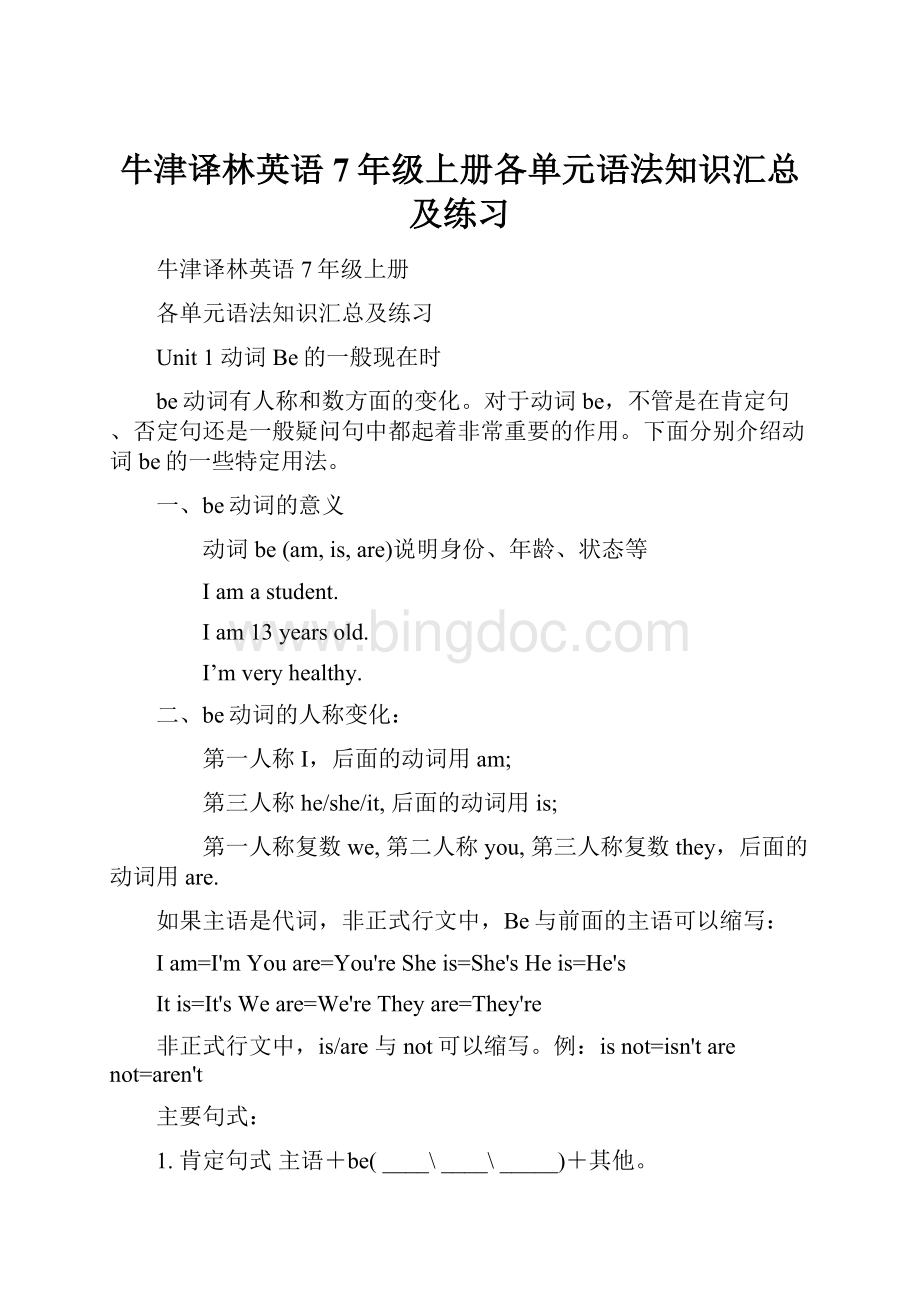牛津译林英语7年级上册各单元语法知识汇总及练习.docx
《牛津译林英语7年级上册各单元语法知识汇总及练习.docx》由会员分享,可在线阅读,更多相关《牛津译林英语7年级上册各单元语法知识汇总及练习.docx(35页珍藏版)》请在冰点文库上搜索。

牛津译林英语7年级上册各单元语法知识汇总及练习
牛津译林英语7年级上册
各单元语法知识汇总及练习
Unit1动词Be的一般现在时
be动词有人称和数方面的变化。
对于动词be,不管是在肯定句、否定句还是一般疑问句中都起着非常重要的作用。
下面分别介绍动词be的一些特定用法。
一、be动词的意义
动词be(am,is,are)说明身份、年龄、状态等
Iamastudent.
Iam13yearsold.
I’mveryhealthy.
二、be动词的人称变化:
第一人称I,后面的动词用am;
第三人称he/she/it,后面的动词用is;
第一人称复数we,第二人称you,第三人称复数they,后面的动词用are.
如果主语是代词,非正式行文中,Be与前面的主语可以缩写:
Iam=I'mYouare=You'reSheis=She'sHeis=He's
Itis=It'sWeare=We'reTheyare=They're
非正式行文中,is/are与not可以缩写。
例:
isnot=isn'tarenot=aren't
主要句式:
1.肯定句式主语+be(____\____\_____)+其他。
2.否定句式主语+be(____\____\_____)+not+其他。
3.一般疑问句将be(____\___\___)提前,即:
Be(____\___\___)+主语+其他?
(第一人称变为第二人称)
肯定回答:
Yes,主语(必须是_____词)+be(____\____\_____)(主语和Be动词不能缩写)
否定回答:
No,主语(必须是_____词)+be(____\____\_____)+not(必须缩写____\_____)
肯定:
Itisabook.→否定:
Itisnotabook./Itisn’tabook.
Iamastudent.→否定:
Iamnotastudent./I’mnotastudent.
Youaremyfriend.→否定:
Youarenotmyfriend./Youaren’tmyfriend.
一般疑问句:
回答一般疑问句时,主语必须是代词
肯定:
Iamastudent.→一般疑问:
Areyouastudent?
SheisfromChina.→一般疑问:
IsshefromChina?
Theyarenurses.→一般疑问:
Mybookisonthetable.→一般疑问:
John是中国人吗?
→一般疑问:
这本书有趣吗?
→一般疑问:
一、用am,is,are填空
1.I_____astudent.
2.You____adoctor.
3.____shefromJinan?
4._____youAmerican?
5.He_____inClass4,Grade1.
6.It_____acar.
7.They____cars
8.____yourmotherinChina?
9.____yourfriendsinNewYork?
10.What____hername?
11.These_____buses.
12.Those_____oranges.
13.Where_____hermother?
14.Howold_____yourteacher?
15.Whatclass_____youin?
16.—I______aboy.______youaboy?
—No,I_____not.
17.Thegirl______Jack’ssister.
18.Thedog_______tallandfat.
19.Themanwithbigeyes_______ateacher.
20.______yourbrotherintheclassroom?
21.—Where_____yourmother?
—She______athome.
22.How_______yourfather?
23.MikeandLiuTao______atschool.
24.Whosedress______this?
25.Whosesocks______they?
26.That______myredskirt.
27.Who______I?
28.Thejeans______onthedesk.
29.Here______ascarfforyou.
30.Here______somesweatersforyou.
31.Theblackgloves______forSuYang.
32.Thispairofgloves______forYangLing.
二、在下面的短文中填上恰当的be动词。
I______agirl.Myname_______Mary.I______inClass2,Grade7.I______12yearsold.Here______myfamilyphoto.Look!
These______myparentsandthose_______mygrandparents.Thisboy______mybrother.He________15yearsoldnow.That______mycat,Mimi.It______verylovely.
Unit2行为动词的一般现在时
什么情况下用行为动词的一般现在时呢?
①当这个动作经常发生或表示习惯性的动作时,通常用一般现在时,它经常与表示频度的时间状语连用,如,当句子中有everyday,everyyear,onSunday,inthemorning,often,sometimes,usually,atoneo’clock,等词时,用一般现在时。
Hegetsupat6o’clock.
SheusuallywatchesTVintheevening.
Sometimeshegoestoschoolbycar.
TomoftenfliesakiteonSunday.
②表示目前的爱好、能力等。
Shesingsverywell.
③表示不受时限的客观事实。
Fishliveinwater.
只有第三人称单数动词才要变,其他人称(I,you,we,they)则用动词的原形。
当主语是第三人称单数时,行为动词的一般现在时通常有三种变化:
1、多数在动词后加s。
play—playslike—likesread—readssing—sings
dance—dancescook—cookslook—looks
2、以s,x,sh,ch,o结尾的动词加es。
go—goeswash--washeswatch-watchescatch-catchesdo-does
3、以辅音字母加y结尾,把y改i再加es。
fly—fliesstudy—studiestry-tries
4、特殊变化have-has
写出下列动词的正确形式:
1.I(go)toschoolatseveninthemorning.
2.Mike(do)hishomeworkateightintheevening.
3.Hisfatheroften(read)booksinthelibraryonSaturday.
4.Mymotherusually(watch)TVplaysathome.
5.Mycousinsometimes(play)cardswithme.
6.—youoften(study)afterschool?
—Yes,Ido.
7.MikeandTomusually(fly)kitesonSunday.
8.They(go)toschoolbybuseveryday.
9.She(go)toschoolbybuseveryday.
10.Weusually(listen)totheradiointhemorning.
11.Heusually(listen)totheradiointhemorning.
12.—heusually(listen)tothemusicathome?
—No,he
主要句式:
一、否定句:
一般现在时的否定式是在动词原形前加助动词donot(don’t);主语是第三人称单数时在动词原形前加助动词doesnot(doesn’t),其结构为:
1)主语+don’t+动词原形
Theydon’tworkhere.
Idon’tgotoschoolonSundays.
2)主语(第三人称单数)+doesn’t+动词原形
Shedoesn’tlikesports.
Theboydoesn’tstudyhard.
注意*:
如句中用了never(从不),hardly(很少、几乎不)等词来表示否定意义,就不能再使用助动词don’t或doesn’t,试比较:
Idon’tknowyou.
Ihardlyknowyou.
Idon’thardlyknowyou.
二、疑问句:
一般现在时的疑问式在句首加助动词do,主语为第三人称单数时在句首加does,其结构是:
1)Do+主语+动词原形…?
Theylivenearourschool.
→Dotheylivenearourschool?
ThestudentslikelearningEnglish.
→DothestudentslikelearningEnglish?
2)Does+主语(第三人称单数)+动词原形…?
HewatchesTVeveryevening.
→DoeshewatchTVeveryevening?
MyfatherteachesChinese.
→DoesyourfatherteachChinese?
简略回答用助动词do/does和don’t/doesn’t代替行为动词。
疑问句的回答:
—Doyouoftengoshoppingwithyourmother?
—Yes,Ido./—No,Idon’t.
Doeshismotherworkinthatfactory?
—Yes,shedoes./—No,shedoesn’t.(回答时须用人称代词)
注意:
在疑问句和否定句中,助动词之后的行为动词均用原形。
区分动词do和助动词do的用法(do既是助动词,又是行为动词),比较下面两个句子:
IdonotdohomeworkonSaturday.
Doyoudohouseworkathome?
1)do用作行为动词一般表示“做”、“干”等意思,
Wedomorningexerciseseveryday.
JackoftendoessomewashingonSundays.
Sheneverdoesherhomeworkintheevening.
2)do用作助动词主要用来帮助构成疑问句、否定句或用于替代等。
Doyoudrivetoworkeveryday?
(帮助构成疑问句)
Hedoesn’tworkonSundays.(帮助构成否定句)
—Doeshelikethejob?
—Yes,hedoes.(用于替代)
写出下列动词在句中的适当形式:
1)We___________(love)sports.
2)She___________(sing)well.
3)TomandJohn___________(watch)TVeveryevening.
4)Myson___________(go)toschoolbybike.
5)Theirteacherusually___________(walk)toschool.
6)Fiveplustwo___________(make)seven.
7)Theyall___________(like)him.
8)Thesun___________(fall)inthewest.
将下列句子改为否定句和疑问句:
1)Theyworkinafactory.
否定句:
疑问句:
2)Marylikessports.
否定句:
疑问句:
3)Theboysgotoschoolonfoot.
否定句:
疑问句:
4)HisfatherandmotherlikewatchingTV.
否定句:
疑问句:
5)Shedoesherhomeworkintheevening.
否定句:
疑问句:
6)Thestudentsdomorningexerciseseveryday.
否定句:
疑问句:
Unit3人称代词
人称代词在句中的作用
主格常位于句首,宾格一般在动词或者介词之后。
1)主格作主语。
表示谁怎么样了、干什么了。
Iamateacher.Youarestudent.
Heisastudent,too.We/You/Theyarestudents.
2)宾格作宾语。
表示动作行为的对象
①Giveittome.
②What'swrongwithit?
人称代词用法口诀:
动前主格动后宾
名前形容介后宾
如果名词含在内
选用名物代就行
代词练习
一、选出括号中正确的词,在正确的词上打勾。
1.Thisis(my/I)mother.
2.Nicetomeet(your/you).
3.(He/His)nameisMark.
4.What’s(she/her)name?
5.Excuse(me/my/I).
6.Are(your/you)MissLi?
7.(I/My)amBen.
8.(She/Her)ismysister.
9.Fine,thank(your/you).
10.Howoldis(he/his)
二、用所给代词的正确形式填空。
1.Theseare______(he)brothers.
2.Thatis_______(she)sister.
3.Tom,thisis_____(me)cousin,Mary.
4.Now_____________(herparent)areinAmerica.
5.Those__________(child)are_____(I)father’sstudents.
6.Doyouknow______(it)name?
7.MikeandTom__________(be)friends.
8.Thanksforhelping________(I).
Unit4表示时间的介词(in/on/at)
①in时间范围大(一天以上)如:
inJanuary,inwinter,in1999;泛指在上午,下午,晚上,如:
inthemorning(afternoon,evening).习惯用法:
inthedaytime在白天。
②on指在某一天或某一天的上午,下午,晚上,如:
onMonday,onSundayafternoon,onJuly1,1999
③at时间最短,一般表示点时间,如atsixo’clock,atthreethirty.习惯用法:
atnight,atnoon,atthistimeofyear.
in,on和at在表达时间方面的区别
in表示在某年、某季节、某月、某周、某天和某段时间
inayear在一年中inspring在春季inSeptember在九月inaweek在一周中inthemorning/afternoon/evening在上午/下午/傍晚但在中午,在夜晚则用atnoon/night
on表示某一天或某一天的某段时间
onMonday在周一onMondayafternoon在周一下午onMarch7th在3月7日onMarch7th,1998.在1998年3月7日onthemorningofMarch7th,1998.在1998年3月7日上午
at表示某个具体时刻。
ateighto’clock在8点钟
atthistimeoftheyear在一年中的这个时候
atthemoment在那一时刻
atthattime在那时
注意:
在英语中,如果时间名词前用this,last,next等修饰时,像这样的表示,“在某时”的时间短语前,并不需要任何介词。
例如:
lastmonth,lastweek,thisyear,thisweek,nextyear,thenextday,thenextyear等。
介词
用于
例如
in
一天中的早中晚
inthemorning/afternoon/evening
月份
inJanuary/February......
季节
inspring/summer/autumn/winter
年
in2008/2012
on
星期
onSunday/Monday/Tuesday......
某一天
on1stSeptember
某一天的早中晚
onacoldmorning/afternoon/evening
特定的节日(某一天)
onChildren'sDay
at
节日不止一天,而是持续一段时间
atChristmas/attheSpringFestival
某一时刻
at4:
15
年龄
at12(yearsold)
口诀:
at用在时刻前,亦与正午、午夜连,
黎明、终止和开端,at与之紧接着相伴。
周月季年长时间,in须放在其前面,
泛指一晌和傍晚,也要放在in后边。
on指特定某一天,日期、星期和节日前
某天上下和夜晚,依然要在on后站。
今明昨天前后天,上下这那每之前,
at、in、on都不用,此乃习惯记心间。
练习
一、用介词in,on,at填空
(一)
______1999_______9:
45_______theevening_______Mondayevening________June________theafternoon_______noon______night______Children’sDay______Teachers’Day_______8o’clock_______Summer_______May______May,1999________May15th,1999
(二)
1.Herbirthdayis_______March14th.
2.Doyouhaveaparty_______September10th.
3.Myfatherisbirthdayis_______August.
4.WehaveourSchoolDay_______nineoclock.
5.Idomyhomework_______Sunday.
6.Hewasbor_______1992.
7.Ithappened_______December12th,1980.
8.Imethim_______September,2000.
二、选择
()1.Childrengetgifts________Christmasand________theirbirthdays.
A.on;onB.at;onC.in;inD.in;on
()2.—Thereisnothing____tomorrowafternoon,isthere?
—No.Wecanhaveagameoftabletennis.
A.onB.inC.outD.up
()3.Alotofstudentsinourschoolwereborn____March,1981.
A.inB.atC.onD.since
()4.Hesuddenlyreturned____arainynight.
A.onB.atC.inD.during
()5.Mygrandfatherwasborn____Oct.10,1935.
A.onB.inC.atD.of
()6.Thetrainisstarting___fiveminutes.
A.inB.atC.forD.still
()7.Mikedoeshisexercises____seven_____theevening.
A.on;toB.at;inC.by;ofD.at;